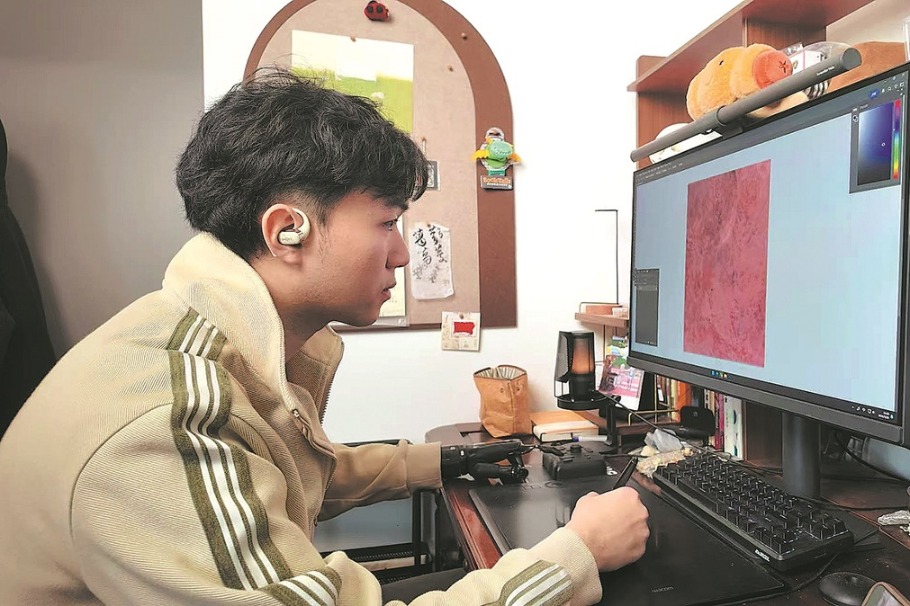Popular vlogger is a natural teacher
University professor using social media to popularize bioscience and help modern urbanites get comfortable in the great outdoors, Yang Feiyue reports.

Guo Guangpu can be a bit eccentric outside the classroom. Instead of acting all prim and proper, the ecology professor from Tongji University in Shanghai breaks the stereotypical image of a stuffy educator, especially when he can be seen sniffing bird droppings, or even pretending to eat them for dramatic effect.
As viewers of this seemingly odd behavior are taken aback, Guo explains: "There is less water and more uric acid in the bird poop, so it can avoid water loss.
"Neither does the bird have a bladder to store the urine, in order to keep the body light, so, that explains the constituents of the droppings," he says.
This somewhat dramatic approach to imparting such knowledge has proved effective in his teaching subjects.
In front of the camera, Guo has mostly maintained a smile, one that highlights the wrinkles that give away his age, but exudes a childlike curiosity and enthusiasm for knowledge.
People can find information on a wide range of interesting natural phenomena in Guo's educational videos on the popular short video sharing platform Douyin, including why pandas prefer bamboo to meat, the differences between Tibetan foxes and their lowland counterparts, as well as an introduction to other canine species that are not dogs.
To date, Guo has made more than 100 short science videos about animals and plants, as well as urban ecology systems, through the presentation of interesting field research. In doing so, he has attracted more than 14,000 followers since March.
His followers have watched his trips to uncover unusual knowledge behind subtropical plants, such as mimosa and lychee in Dongguan of Guangdong province, seen the Asiatic toad and Tianmu odorous frog at close quarters on Tianmu Mountain in Zhejiang province, and discovered weird fruits of various shapes and sizes in Yunnan province.
"Science videos are not easy to do, you have to maintain professionalism while also ensuring that the presentation is lively and interesting, so that people with different levels of knowledge can understand," Guo says.
He has stuck to the scientific rigor expected of a university professor in producing these online works, and has looked up a lot of information to ensure that there are no mistakes.
For example, Guo says he read several doctoral theses just to answer accurately the question about how much bamboo a giant panda consumes a day, before delivering the explanation in plain words.
He also likes to physically demonstrate facts.
In a video, he had a gecko bite his finger to prove the reptile doesn't chew, and then showed how this creature's teeth are only for keeping food from falling out of its mouth.
His efforts have appealed to a group of fans longing to expand their knowledge online.
Some of his videos have received as many as 17,000 likes.
"Under the guidance of Professor Guo, even without leaving home, I am able to appreciate the vast land and abundant natural resources across the country," says Ren Jiaxi, one of Guo's Douyin followers.
"His video is like a spell that stimulates your interest in learning," Ren adds.
Guo says that he is not a professor who puts an emphasis on repeatedly setting exams to grasp knowledge.
It reflects his education philosophy. He says he wants to enable people to learn about the world around them and to avoid being at a loss in a natural environment.
"Only then can people better face their problems, analyze them, solve them, and enhance their creativity," he says.
Last year, he set up a Practical Ecology course, in which he took students into the wilderness and to museums to survey, observe and monitor animals.
During a session where he was meant to expose them to birds in the city, he found some students were fearful around wild animals. He encouraged them to rescue three fledglings and make nests for them, before transferring them to their new homes by hand.
"I want my students to know that we survive because of biodiversity, and that everyone is a beautiful part of it," Guo says.
Having taught at university for decades, Guo launched his online project for the same reasons as his Practical Ecology course.
He noticed that young people today are too afraid of nature.
"Many people scream at the sight of small insects," he says, adding that it perplexed him.
"When and how did humans become like this?"
Guo has been involved with flora and fauna since he was a child.
He was born in Bo'ai county, Central China's Henan province. His parents worked in the agriculture and forestry sector, so he was exposed to a great deal of knowledge about related fields.
This childhood predisposition saw him pursue biology for his undergraduate studies at Henan Normal University in the 1980s. And then he went on to explore a similar discipline at postgraduate level, before studying for his doctorate in ecology at East China Normal University. After completing the latter in 2004, he began teaching at Tongji University.
During his studies, Guo found that learning could be a fun experience.
He still remembers his doctoral research at Zhoushan, a maritime city in Zhejiang province.
"I roamed around on my bicycle, before lying on the grass to listen to the waves," he recalls, adding that he enjoyed watching the clouds and observing the birds and flowers.
"I really had a lot of fun."
After becoming a university professor, Guo has mainly taught zoology and ecology on campus, while outside the classroom, he has been preaching what he preaches — getting in touch with nature.
Every year, Guo spends a considerable amount of time outdoors.
He has conducted field research on the Bengal tiger, Forest musk deer, takin and Asian black bear in Medog county of Tibet autonomous region and observed the Oriental scops-owl at the raptor rescue center in Dali Bai autonomous prefecture of Yunnan province.
When surveying in Tianmu Mountain of Zhejiang province, he stunned people around him by grabbing a poisonous Stejneger's pit viper by the neck in one split-second hand movement.
Guo's footprints have also been left on Wuyi Mountain in Fujian province, Naozhou Island of Guangdong province, as well as in South Africa, Sweden, France and Australia.
Guo has also given guidance at nature science activities and summer camps across the country. And he travels to various national reserves and national parks to offer training for staff members.
He has made it a personal mission to help people regain the courage to develop a relationship with nature through the internet platform, which has inspired a great number of young people.
Guo has found that people become happy when they are in a natural environment.
He recounts the time when one of his seemingly timid students was immersed in a sea of rapeseed blossoms during a spring expedition at Chongming Island, Shanghai, burst into singing, impersonating the late Italian tenor Luciano Pavarotti in front of a crowd of onlookers.
"Nature has a power to awaken people's feelings and expressions of beauty," Guo says.
"This appreciation of beauty is engraved in our genes. It may usually be switched off, yet sparks to life when venturing into nature."
Although the living conditions are simple and crude, and peril might lurk behind every tree during natural exploration, Guo has come to see it as a fun and irreplaceable part of his life.
"Nature is my first love, and will, eventually, be my last," Guo says.
































